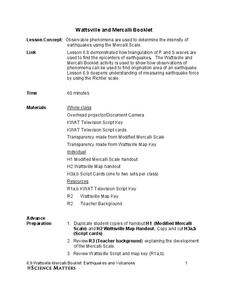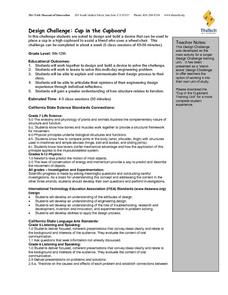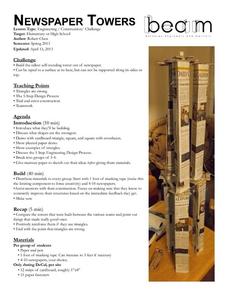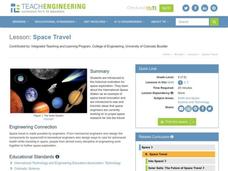Polytechnic Institute of NYU
Potential vs. Kinetic Energy
Legos in science class? Watch your pupils fall in love with this activity. After learning to measure potential and kinetic energy, young scientists create their own ramps using Lego Mindstorm sensors and software.
Teach Engineering
Just Plane Simple
It is plane to see that simple machines help reduce the force needed to perform a task. This resource introduces three of the simple machines--the inclined plane, the wedge, and the screw, and the formulas in order to be able...
Teach Engineering
Ranking the Rocks for Desired Properties
Math rocks! Cavern design teams determine the rankings of rock types based upon desirability points. The points are connected to the properties of the rocks and their usefulness in building a cavern.
Curated OER
Attack of the Raging River
Learners explore mass and volume. For this mass and volume lesson, students pretend to be on a hike and have lost their way. Learners must cross a river get back on track. Students must use mass, volume, surface area, density, property...
Teach Engineering
Clean it Up!
Harness the power of bacteria. Scholars see how using organisms that exist in nature can help solve human problems in the process known as bioremediation. They research and discuss several successful examples, such as using oil-eating...
Curated OER
What is Biotechnology?
Young consumers explore the concept of biotechnology as it pertains to the foods they eat, economics, and agriculture. They watch several videos, explore a website, complete worksheets, and engage in class discussion. Son they'll know...
University of Colorado
Patterns and Fingerprints
Human fingerprint patterns are the result of layers of skin growing at different paces, thus causing the layers to pull on each other forming ridges. Here, groups of learners see how patterns and fingerprints assist scientists in a...
Science Matters
Wattsville and Mercalli Booklet
There has been an earthquake! Can you listen to the description of damage given by callers in order to determine the epicenter? The 11th of 20 lessons has pupils read a script of one emergency caller. The class records the information on...
NOAA
Biological Oceanographic Investigations – Call to Arms
How many simple machines does it take to make a robotic arm? An inquiry-based lesson explores that topic and challenges pupils to build a robotic arm that can stretch, turn, and more. A few questions help guide them in the...
Curated OER
A Good Foundation
Students examine how regional geology affects bridge foundations. In this physical science lesson, students explore how bridge types are constructed for different purposes.
Curated OER
Making & Breaking : The Rock Cycle
Middle schoolers examine the rock cycle and how rocks can change over time. In this geotechnical engineering lesson students draw a diagram of the rock cycle.
Curated OER
Design Challenge: Cup in the Cupboard
Students design device that will place a cup into a cupboard for a physically challenged person. They study the engineering design and how structure relates to function.
Teach Engineering
Exploring the Forces of Tension
Let the resource stretch the minds of your young scientists with a lesson about tensile strength and stiffness of materials. Groups consider how easily materials stretch and relate this property to engineering design.
Curated OER
Stressed and Strained
Learners explore stress and strength in engineering design. In this engineering lesson, students become familiar with terminology associated with stress and strain on building material. They will have a class discuss about how their beam...
Berkeley Engineering and Mentors
Newspaper Towers
The challenge is quite simple: build a tall tower from a predesignated number of newspaper sheets. Emerging engineers work in teams to build the tallest structure. You will demonstrate some structure shapes and discuss their relative...
Curated OER
Passive Solar Design
Students study what passive solar design is for buildings and structures. In this solar design lesson students identify passive solar design techniques.
Curated OER
Biomedical Devices for the Eyes
Students study the structures of the human eye. In this eye device lesson students examine different eye problems and devices that can help to resolve them.
Curated OER
Breathe In, Breathe Out
Young scholars study the respiratory system, the lungs and air. In this respiratory lesson plan students describe technologies that engineers have found that improve the health of the respiratory system.
Curated OER
Measure Twice, Cut Once
Elementary schoolers learn about metric units and how they are used by engineers. They learn how engineers use the units to measure mass, distance, and volume. Then, they estimate measurements of units, and compare them to actual...
Curated OER
Space Travel
Students study the International Space Station and space exploration. In this space travel lesson students describe the different types of engineers that contribute to space travel.
Teach Engineering
Win that Bid! Selling Your Power Solution
Power up! Class members research a type of power production using a great resource featuring a real-world problem. Groups select a type of power generation and pretend that they represent an engineering firm for their chosen power type....
Curated OER
Off the Grid
Learners examine the advantages and disadvantages of renewable and non renewable energy sources. In this engineering lesson students explain what it means for a house to be "off the grid".
Curated OER
The Crash Scene
Fifth graders explore geography by participating in a mapping activity. In this engineering lesson, 5th graders identify the differences between latitude and longitude and practice locating precise points on a globe or map. Students...
Curated OER
Plumbing the Deep-Using Sound Waves to See
Students explore and learn about the concept of echolocation. In this echolocation lesson, students explore how animals and engineers use echolocation (seeing under water) and sound waves to look and hear things under the deep water.

























